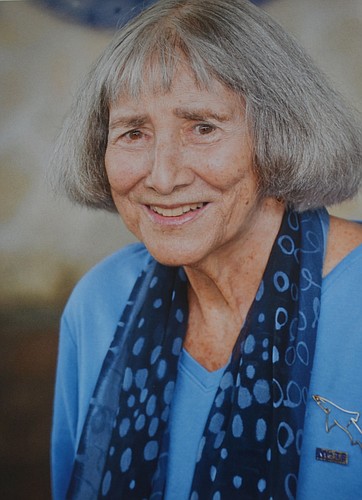- April 25, 2024
-
-
Loading

Loading

Mote Marine Laboratory founder and famed “Shark Lady” Eugenie Clark died Feb. 25.
When her family members spread her ashes five days later from the ship R/V Eugenie Clark into the Gulf of Mexico, they encountered a special visitor:
“Someone took a picture of us, and in the water, right beside us, was a shark,” Clark’s only grandson, Eli Weiss told a crowd of hundreds at a May 4 celebration of life for his grandmother. “I hope you enjoy your last dive, Grandma Genie.”
Mote held Clark’s celebration May 4 because it would have been her 93rd birthday. The service featured videos and speeches by those who knew her.
“She touched a lot of people,” said Kumar Mahadevan, president emeritus of Mote. “She had a great bond to this community. Even when she left in 1966, this was her extended family.”
Born in 1922, in New York City, Clark discovered her love for the ocean at the New York Aquarium at Battery Park when she was 9. She studied zoology at Hunter College, earned her master of arts in zoology at New York University in 1946 and her doctorate in 1950.
In 1955, Clark founded the Cape Haze Marine Laboratory in Placida. After years of success, it became Mote Marine Laboratory in 1967. What was once a one-room lab has since become a world-class research facility with six campuses in Florida and more than 200 staff members.
“We come together to celebrate a very meaningful life,” Mote President and CEO Michael Crosby said at the celebration. “She was a mentor, colleague and good friend to enjoy a martini with. Her life was an extremely exciting story.”
In 1968, Clark left Sarasota to teach at the University of Maryland, where she stayed until her retirement in 1992.
“She was an extraordinarily important figure,” University of Maryland Provost Mary Ann Rankin said. “She’s a real legend. The whole university mourns her loss.”
Although Clark leaves a legacy of success as a marine scientist, those close to her remember her love of life and ever-present sense of humor.
“The thing that struck me was how approachable, humble and how easy she was to talk to,” Mahadevan said. “There’s not one time I recall that she was ever cross or upset about anything.”
Clark, who was partially of Japanese descent, succeeded at a time when both women and Japanese citizens were struggling to gain equal footing in the U.S.
“In those, days, there was a great prejudice against Orientals,” said Jose Castro, of NOAA Fisheries and biographer of Clark. “She was a pioneer in opening careers for women. She had the three qualities that are necessary to be a good scientist: curiosity, education and determination.”
Clark was especially close to her grandson.
“She taught me about so many different things throughout the years,” Weiss said. “There are really so many memories. She really loved life, (and) she enjoyed it to the fullest.”
In her later years, Clark never allowed herself to act her age. At 88, she dove off a high dive, and on her 92nd birthday last year she went scuba diving.
“The week before she passed, I had never seen her happier,” Mahadevan said. “I couldn’t believe it. She was so happy and so relaxed. She said, ‘I’ve had a good life, a very good life.’ I hope when my time comes I can say that.”
“She was a pioneer in opening careers for women. She had the three qualities that are necessary to be a good scientist: curiosity, education and determination.” — Jose Castro, of NOAA Fisheries and Clark’s biographer Clark